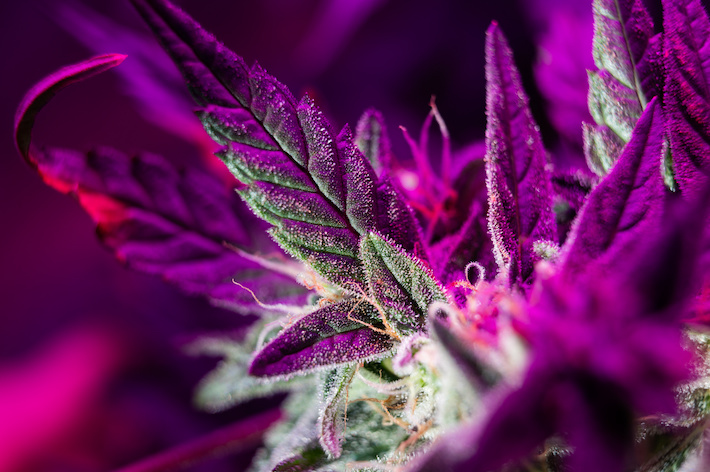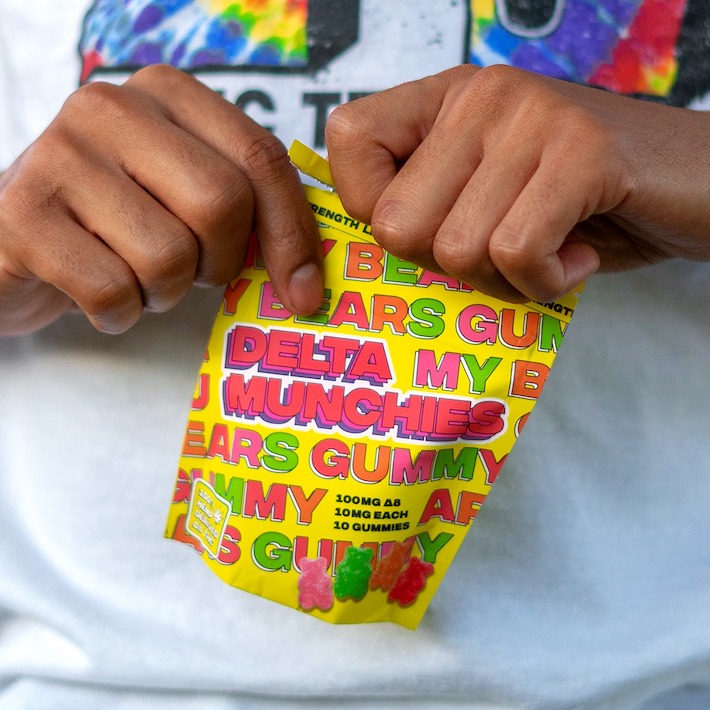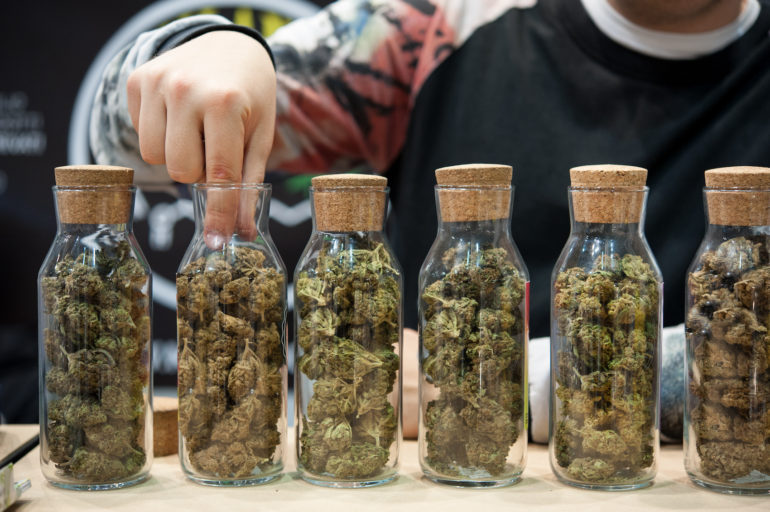Delta-9 and delta-8 are distinct THC molecules with different uses, likelihood of side effects, and legal statuses.
Delta-9 is the most well-known version of THC with therapeutic potential in chronic pain, nausea and vomiting, anxiety, sleeping issues, and more.
Delta-8 is about 50-75% as potent and not as likely to cause anxiety or paranoia as delta-9. It may also help prevent vomiting. However, it carries similar cognitive impairments.
Delta-8 and even that tiny bit (<0.3%) of delta-9 in hemp are federally legal but may not be available everywhere. Cannabis products higher in delta-9 vary in legality by state.
What Are the Main Differences Between Delta-8 and Delta-9 THC?
When deciding between using delta-8 or delta-9 THC, the two biggest differences you should consider are intensity and legality.
Consumers looking for a more mellow and clear experience may pick delta-8 THC. Medical patients with moderate to severe needs will likely need the full strength of delta-9 THC.
The sourcing of these cannabinoids determines whether they are legal or not in your area.
Here is a summary of the differences:
Characteristics
- Delta-8 is estimated to be only 50-75% as potent as delta-9
- Delta-8 research suggests a significantly lower risk of the uncomfortable side effects of delta-9 like anxiety and paranoia
- The duration of a delta-8 high may be shorter than a delta-9 high
- Because of these, many people are substituting delta-8 for delta-9
- Delta-9 is the most commonly known and researched intoxicating cannabinoid
- Less research has been done on delta-8 and so less is known about its short and long-term effects
Sourcing
- Delta-8 is produced in almost negligible amounts in cannabis plants, whereas delta-9 dominates type 1 cannabis
- Mass production requires delta-8 products to be semi-synthetically produced from CBD
- Delta-8 products of suboptimal quality may be contaminated with 22 times higher THC or even harmful byproducts or residues
Legality
- Hemp products containing delta-8 and <0.3% delta-9 are federally legal
- There are federal restrictions and varying state-by-state limitations on delta-9 THC cannabis (>0.3% delta-9 THC)
Drug Testing
- Delta-8 and delta-9 are both forms of THC metabolized so similarly that basic drug testing may not tell the difference and likely cause a positive result
Benefits and Side Effects of Delta-9 THC

Delta-9 THC Benefits
When people think of cannabis they usually think about the medical and euphoric effects of THC, specifically delta-9. But what makes THC “delta-9” or “delta-8”?
Imagine that THC has a bridge called a double bond between the 9th and 10th carbon. In delta-8, this landmark is between the 8th and 9th carbon.
THC comes in a few varieties (e.g. delta-8, delta-10) depending on where the bridge (double bond) is built. Molecularly speaking, that’s it.
Delta-9 was discovered in 1964 and has much more research focused on its potential medical uses. It is seldom studied as a pure isolate, usually in some combination with CBD.
Modern preclinical and clinical cannabis studies and evidence reviews suggest THC has therapeutic potential for symptoms and conditions including but not limited to:
- Chronic pain
- Nausea and vomiting
- Appetite stimulation
- MS-related muscle spasticity
- Seizures and epilepsy
- Glaucoma
- Anxiety
- PTSD
- Panic attacks
- Depressive symptoms
- Back problems
- Sleep issues
- Cancer
- HIV/AIDS
- Bronchodilation
- Itching
- Neuroprotection
- Inflammation and oxidation
However, delta-9 has a narrower window of therapeutic use than other cannabinoids because of its intoxicating and uncomfortable effects at relatively lower doses.
Delta-9 THC Adverse Effects
The side effects of delta-9 are generally dose-dependent and self-limited. Meaning taking more increases the chances of adverse events, and once it is metabolized they go away.
The adverse effects may include:
- Euphoria or dysphoria
- Sedation
- Fast heart rate
- Low blood pressure
- Dizziness
- Dry mouth
- Dry eyes
- Psychotic symptoms
- Cognitive impairments (memory, learning, spatial, and attention)
Benefits and Side Effects of Delta-8 THC
Delta-8 THC Benefits
Simply shifting the double bond bridge causes delta-8 to give similar potential benefits as delta-9 with an easy-going high. It binds less to the CB1 receptor than delta-9, reducing the chances of psychoactive side effects.
According to the only clinical trial and a recent survey of delta-8 consumers, the other benefits may include use for:
- Control of nausea and vomiting
- 50-75% potency of delta-9
- Relaxation
- Euphoria
- Pain relief
- Anxiety or panic attacks
- Sleep issues or insomnia
- Chronic pain
- Depression or bipolar disorder
- Stress
- Most did not report anxiety (74%) or paranoia (83%)
Delta-8 THC Adverse Effects
While most survey participants did not report anxiety or paranoia, there was a small percentage that did.
Consumers also endorsed similar cognitive difficulties in:
- Concentration
- Short-term memory
- Altered time sensation
Will Delta-8 or Delta-9 THC Show Up on a Drug Test?
Yes, delta-8 and delta-9 will most likely cause a positive result for cannabinoids on drug screens. It mostly depends on the amount and frequency consumed, with some biological variables.
Both are forms of THC so similar that their processing and metabolites are largely the same. This creates problems in the world of drug testing and requires advanced differentiation techniques currently not built into standard lab facilities.
In essence, either delta-8 or delta-9 may trigger detection of cannabis use even if it’s from a legal source like hemp.
RELATED: Does Delta-8 THC Show Up on a Drug Test?
An important note is that sometimes products advertised as hemp-based delta-8 may also contain unexpectedly high amounts of delta-9 THC in excess of the legal limit, increasing consumer risk in drug testing.
Are Delta-8 and Delta-9 THC Legal?

Hemp and its derivative products like delta-8 are federally legal per the 2018 Farm Bill and must contain <0.3% delta-9 THC. However, interpretations of this law and individual state policies have complicated the status of both delta-8 and delta-9.
Delta-8 made from the CBD in hemp is federally legal and available in most states. Even the small percentage of naturally occurring delta-9 THC present in hemp by definition is allowed.
RELATED: Where Is Delta-8 THC Legal? (Map of States)
What is clear, however, is that any delta-8 or delta-9 products containing more than 0.3% delta-9 by dry weight are not federally legal. This includes cannabis-derived and delta-8 products contaminated with extra delta-9, even if originally from hemp.
State-specific restrictions on these cannabinoids vary so always double-check your local laws.
Conclusion: Delta-8 vs. Delta-9
Making the choice between delta-8 or delta-9 boils down to the legal access you have and whether you want partial or full-strength THC. Choosing delta-8 likely means a lower chance of anxiety and paranoia than delta-9.
Consumers looking for a lighter, casual daytime high may opt for delta-8, especially in states where delta-9 isn’t legal. Product quality should be of chief concern to avoid unwanted delta-9 contamination.
If you have medical needs, delta-9 is more supported by research for a wider variety of conditions. When the dose and route are right then the side effects can be largely avoided.
References (10)
- Kruger, J. S., & Kruger, D. J. (2022). Delta-8-THC: Delta-9-THC’s nicer younger sibling? Journal of Cannabis Research, 4(1), 4. https://doi.org/10.1186/s42238-021-00115-8
- Ebbert, J. O., Scharf, E. L., & Hurt, R. T. (2018). Medical Cannabis. Mayo Clinic Proceedings, 93(12), 1842–1847. https://doi.org/10.1016/j.mayocp.2018.09.005
- Maccarrone, M., Bab, I., Bíró, T., Cabral, G. A., Dey, S. K., Marzo, V. D., Konje, J. C., Kunos, G., Mechoulam, R., Pacher, P., Sharkey, K. A., & Zimmer, A. (2015). Endocannabinoid signaling at the periphery: 50 years after THC. Trends in Pharmacological Sciences, 36(5), 277–296. https://doi.org/10.1016/j.tips.2015.02.008
- Kruger, D. J., & Kruger, J. S. (2023). Consumer Experiences with Delta-8-THC: Medical Use, Pharmaceutical Substitution, and Comparisons with Delta-9-THC. Cannabis and Cannabinoid Research, 8(1), 166–173. https://doi.org/10.1089/can.2021.0124
- Tagen, M., & Klumpers, L. E. (2022). Review of delta-8-tetrahydrocannabinol (Δ8-THC): Comparative pharmacology with Δ9-THC. British Journal of Pharmacology, 179(15), 3915–3933. https://doi.org/10.1111/bph.15865
- Reber, J. D., Karschner, E. L., Seither, J. Z., Knittel, J. L., Dozier, K. V., & Walterscheid, J. P. (2022). An Enhanced LC–MS-MS Technique for Distinguishing Δ8- and Δ9-Tetrahydrocannabinol Isomers in Blood and Urine Specimens. Journal of Analytical Toxicology, 46(4), 343–349. https://doi.org/10.1093/jat/bkac007
- National Academies of Sciences, Engineering, and Medicine, Health and Medicine Division, Board on Population Health and Public Health Practice, & Committee on the Health Effects of Marijuana: An Evidence Review and Research Agenda. (2017). The Health Effects of Cannabis and Cannabinoids: The Current State of Evidence and Recommendations for Research. National Academies Press (US). https://www.ncbi.nlm.nih.gov/books/NBK425767/
- Abrahamov, A., Abrahamov, A., & Mechoulam, R. (1995). An efficient new cannabinoid antiemetic in pediatric oncology. Life Sciences, 56(23), 2097–2102. https://doi.org/10.1016/0024-3205(95)00194-B
- Walsh, K. B., McKinney, A. E., & Holmes, A. E. (2021). Minor Cannabinoids: Biosynthesis, Molecular Pharmacology and Potential Therapeutic Uses. Frontiers in Pharmacology, 12. https://www.frontiersin.org/articles/10.3389/fphar.2021.777804
- Russo, E. B. (2011). Taming THC: Potential cannabis synergy and phytocannabinoid-terpenoid entourage effects. British Journal of Pharmacology, 163(7), 1344–1364. https://doi.org/10.1111/j.1476-5381.2011.01238.x
